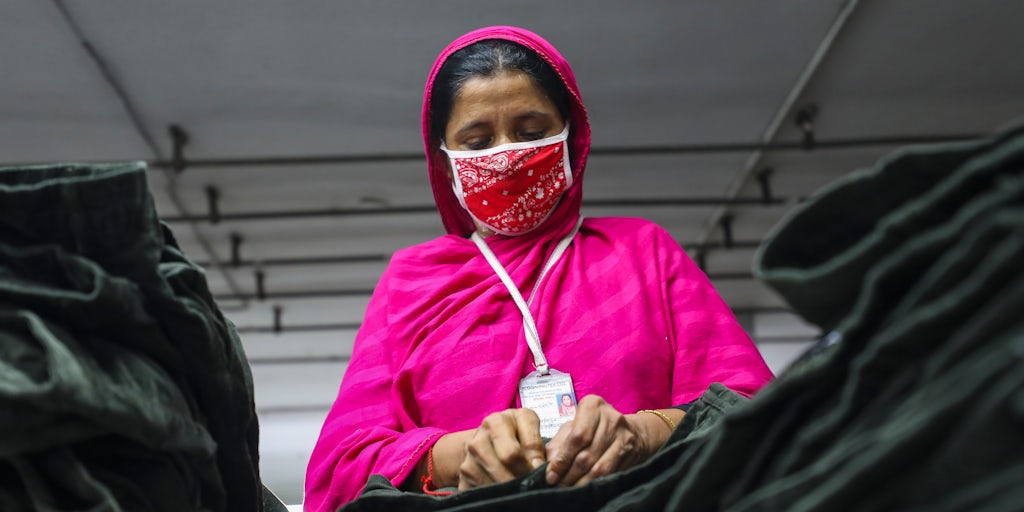How Lockdown 2.0 Is Hitting the Supply Chain | BoF Professional

It didn’t take long for the order cancellations to start.
After a brief reprieve over the summer, much of Europe has spent the last month in lockdown. And even as some of the toughest restrictions begin to lift, the situation in North America is worsening; Covid-19 cases in the US are currently close to 200,000 a day. Panicked brands are scrambling to scale down inventory. And once again, fashion’s supply chain is facing the consequences.
“I think that our customers are feeling uncertain about the future with this looming second wave of lockdowns,” said Hilmond Hui, vice president of Hong Kong-based silk supplier and textile manufacturer Bombyx, projecting a difficult and choppy winter across markets. Cancellations are less frequent than they were in March, but they’re coming faster. “It’s possible that [our brand partners] are choosing to act earlier now,” said Hui, who supplies brands including Everlane, Club Monaco and Madewell.
The first wave of the pandemic devastated fashion’s supply chain as brands cancelled billions of dollars of orders, in some cases even refusing to take delivery of goods already on the water. Those actions were compounded by localised outbreaks that forced factories in many manufacturing hubs to close. At least 3.5 million garment workers have already lost their jobs, missed months of pay or had their salaries cut, according to a report by the Centre for Global Workers’ Rights (CGWR) and Worker Rights Consortium.
While the crisis has ratcheted up scrutiny on the relationship between brands and their suppliers, the latest wave of lockdowns threatens to deepen the economic and humanitarian crisis already punishing fashion’s manufacturing base. How the industry handles the mounting crisis could define the shape of the supply chain in the coming years.
“Covid-19 has exposed to a much greater degree just how fragile these supply chains were,” said Professor Mark Anner, director of the School of Labour and Employment Relations at Penn State University and director of the CGWR. “It has made the problems that much clearer to a lot of observers.”
Many of the challenges currently facing fashion’s supply base are structural, but the second wave of lockdowns have turned pre-existing pressure points into an existential crisis for many manufacturers.
For instance, payment times have ballooned from between 30 to 60 days after shipment to an average of 77 days, according to CGWR and Worker Rights Consortium’s research. Some payments have been pushed to 90 and even 120 days out. Because manufacturers typically pay out of pocket for the fabrics required to produce orders, such delays leave them particularly financially exposed and with little cushion to navigate the fallout from further lockdowns.
“This wreaks havoc on the cash flow in the industry and dramatically increases the likelihood that supplier factories will go out of business,” said Anner. “This is how workers become unemployed.”
The pandemic has also exacerbated price pressure within the industry, as brands pulled back in response to slumping consumer demand that left many retailers facing bankruptcy. Many brands that are still placing orders are doing so at the last minute to decrease the risk of getting stuck with inventory they cannot shift. The result is that suppliers are left battling over fewer orders with faster turnaround speeds for less money and more uncertain payment terms.
Manufacturers are not in a position to do a hard negotiation. My prime objective is not to make money, it’s to feed my workers.
“Manufacturers are not in a position to do a hard negotiation,” said Mostafiz Uddin, managing director of Bangladesh-based denim supplier Denim Expert Limited. Now, after months of withheld and delayed payments, “my prime objective is not to make money, it’s to feed my workers,” he said.
Uddin is not alone. By October this year 56 percent of suppliers said they had produced some orders at below the cost of production, according to the CGWR and Worker Rights Consortium’s survey. Even brands that committed to cover finished orders during the first round of lockdowns are now cutting back or refusing to commit to large orders, suppliers and labour advocates say.
“The problem is that even the brands that helped workers in Bangladesh and Cambodia will now say they are cutting their resources and reducing costs,” said Miguel Sanchez, a board member of denim supply chain NGO Transformers Foundation. If the current situation continues, 57 percent of manufacturers fear they might go bankrupt, according to the CGWR and Worker Rights Consortium’s findings.
Amid a bleak economic outlook, calls for change are mounting.
“Brands need to monitor their supply chains better and ask: what do I need to do to ensure that workers are paid?” said Christie Miedema, campaign and outreach coordinator of Clean Clothes Campaign. While Western brands typically don’t directly employ the workers who make their clothes, it’s the brands that are “driving this race to the bottom,” said Miedema. “They have so much influence.”
To be sure, major fashion companies have made public commitments to protect workers in their supply chain, and the International Labour Organisation has made progress coordinating governments, financial institutions and the industry to provide some support for garment workers in major manufacturing hubs.
But without structural change, many see worse still to come. Uddin claims he still has not received the money he was owed by brands eight months ago for orders he produced, despite receiving attention from both press and activists. “They never paid the money, they never answered the emails,” he said.
And while orders are still coming in — albeit less frequently — with so much at stake, manufacturers are less likely to speak out this time around, labour advocates say. “Many suppliers who were talking to us in the early days are now terrified of talking to us or going to the press because the brands threatened them,” said Ayesha Barenblat, founder and chief executive of non-profit Remake.
While some see opportunities for consolidation across the supply chain that could ultimately lead to deeper, healthier partnerships between buyers and suppliers down the line, sceptics argue that only external regulation will fix the problems that are gaining increasing exposure through successive lockdowns.
“Some buyers are behaving unethically not only during the pandemic but also long before [the crisis],” said Uddin. “But they keep going with business as usual … We need to start learning from the past.”
Related Articles:
Op-Ed | Why Fashion Must Help Bangladeshi Workers Survive Coronavirus
Fashion’s Humanitarian Crisis
Op-Ed | How Fashion Perpetuates Modern-Day Colonialism
BoF’s ANNUAL GATHERING FOR BIG THINKERS
VOICES brings together the movers, shakers and trailblazers of the global fashion industry and unites them with the big thinkers, entrepreneurs and inspiring people who are shaping the wider world, hosted by BoF founder and editor-in-chief, Imran Amed, and led by BoF’s expert editors and correspondents.
Register now to reserve your spot.
1. THE WIDER WORLD: Making sense of 2020 and charting a way forward
2. INSIDE THE FASHION SYSTEM: Addressing the industry’s most important challenges and opportunities
3. TECHNOLOGY & INNOVATION: Exploring how new technologies will change consumer behaviour
4. REINVENTING RETAIL: Understanding how forces accelerated by the pandemic are completely reshaping the retail landscape
5. LIVE YOUR BEST LIFE: Finding the balance, insight and inspiration to be the most authentic, healthy version of yourself
JOIN US FOR A GLOBAL CONVERSATION ABOUT THE FUTURE OF THE FASHION INDUSTRY
This year, VOICES will be delivered via a live broadcast adapted to the unique circumstances of the Covid-19 era — and BoF Professional and BoF Professional Student members anywhere in the world can take part in this live global conversation as the industry looks ahead to 2021. If you are not a member, sign up today with our 30 day trial, including access to VOICES 2020.



